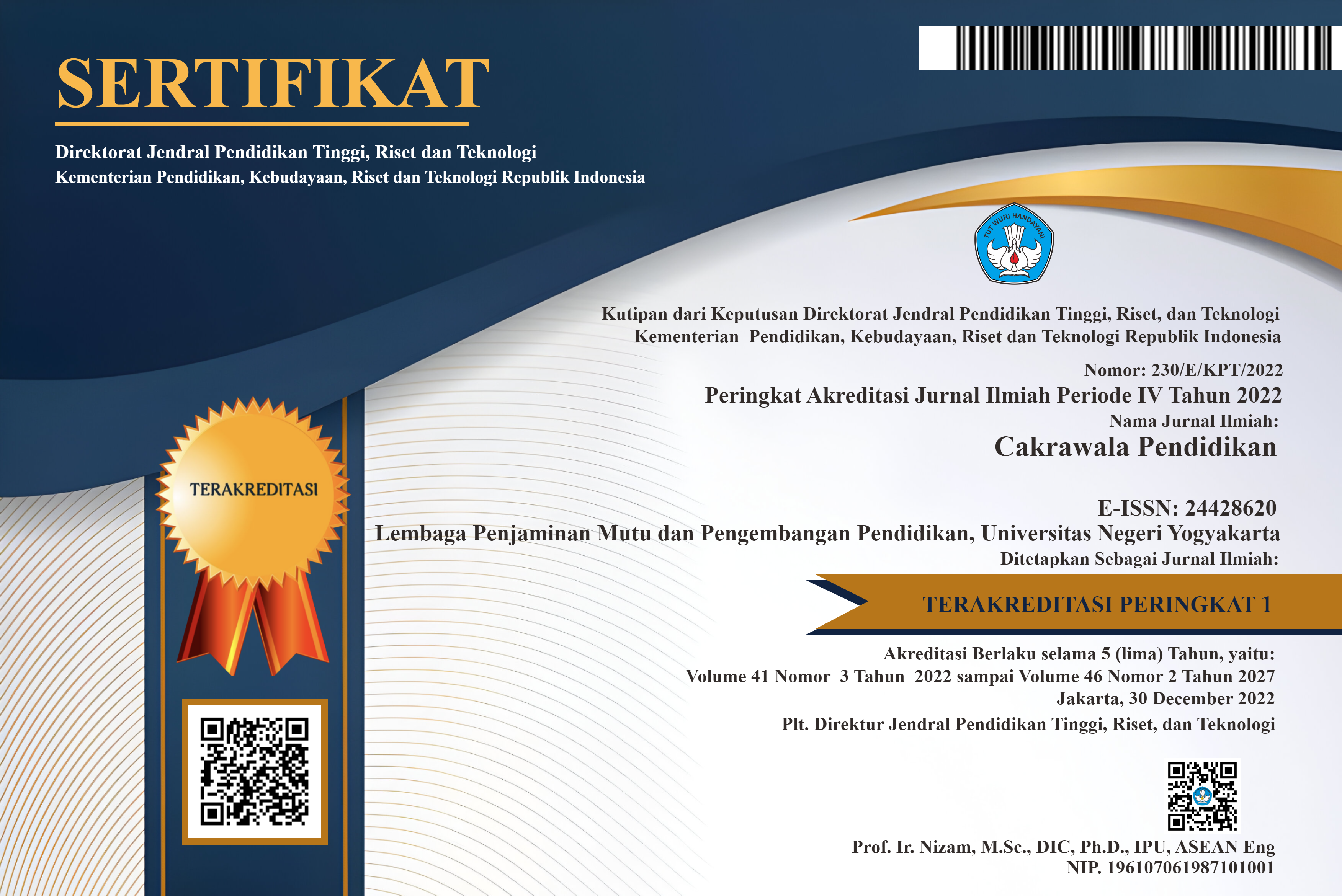Immersive learning through virtual reality for civil engineering education
Downloads
Downloads
Allcoat, D., & von Mí¼hlenen, A. (2018). Learning in virtual reality: Effects on performance, emotion and engagement. Research in Learning Technology, 26. https://doi.org/10.25304/rlt.v26.2140
Beck, D. (2019). Special Issue: Augmented and virtual reality in education: Immersive learning research. Journal of Educational Computing Research, 57(7), 1619–1625. https://doi.org/10.1177/0735633119854035
Bower, M., Howe, C., McCredie, N., Robinson, A., & Grover, D. (2014). Augmented reality in education–cases, places and potentials. Educational Media International, 51(1), 1–15.
Chenari, M. U., Sarvestani, M. S., Azarkhavarani, A. R., Izadi, S., & Cirella, G. T. (2024). Enhancing e-learning in higher education: Lessons learned from the pandemic. E-Learning and Digital Media. https://doi.org/10.1177/20427530241268433
Chou, C.-C. (2017). An analysis of the 3d video and interactive response approach affects the science remedial teaching for fourth-grade underachieving students. EURASIA Journal of Mathematics, Science and Technology Education, 13(4). https://doi.org/10.12973/eurasia.2017.00658a
Concannon, B. J., Esmail, S., & Roduta Roberts, M. (2019). Head-mounted display virtual reality in post-secondary education and skill training. Frontiers in Education, 4. https://doi.org/10.3389/feduc.2019.00080
Dhalmahapatra, K., Das, S., & Maiti, J. (2022). On accident causation models, safety training and virtual reality. International Journal of Occupational Safety and Ergonomics, 28(1), 28–44. https://doi.org/10.1080/10803548.2020.1766290
Eiris, R., Wen, J., & Gheisari, M. (2021). iVisit – Practicing problem-solving in 360-degree panoramic site visits led by virtual humans. Automation in Construction, 128, 103754. https://doi.org/10.1016/j.autcon.2021.103754
France, D., Powell, V., Mauchline, A. L., Welsh, K., Park, J., Whalley, W. B., & Rewhorn, S. (2016). Ability of students to recognize the relationship between using mobile apps for learning during fieldwork and the development of graduate attributes. Journal of Geography in Higher Education, 40(2), 182–192. https://doi.org/10.1080/03098265.2016.1154931
González, M. A., Santos, B. S. N., Vargas, A. R., Martín-Gutiérrez, J., & Orihuela, A. R. (2013). Virtual worlds: Opportunities and challenges in the 21st century. Procedia Computer Science, 25, 330–337. https://doi.org/10.1016/j.procs.2013.11.039
Hasan, M. Z., Mallik, A., & Tsou, J.-C. (2020). Learning method design for engineering students to be prepared for Industry 4.0: A Kaizen approach. Higher Education, Skills and Work-Based Learning, 11(1), 182–198. https://doi.org/10.1108/HESWBL-07-2019-0098
Innocenti, E. D., Geronazzo, M., Vescovi, D., Nordahl, R., Serafin, S., Ludovico, L. A., & Avanzini, F. (2019). Mobile virtual reality for musical genre learning in primary education. Computers & Education, 139, 102–117. https://doi.org/10.1016/j.compedu.2019.04.010
Kí¶psel, V., de Moura Kiipper, G., & Peck, M. A. (2021). Stakeholder engagement vs. social distancing"”how does the Covid-19 pandemic affect participatory research in EU marine science projects? Maritime Studies, 20(2), 189–205. https://doi.org/10.1007/s40152-021-00223-4
Lewis, K. O., Popov, V., & Fatima, S. S. (2024). From static web to metaverse: reinventing medical education in the post-pandemic era. Annals of Medicine, 56(1). https://doi.org/10.1080/07853890.2024.2305694
Lin, Y.-J., & Wang, H. (2021). Using virtual reality to facilitate learners' creative self-efficacy and intrinsic motivation in an EFL classroom. Education and Information Technologies, 26(4), 4487–4505. https://doi.org/10.1007/s10639-021-10472-9
Makransky, G., & Lilleholt, L. (2018). A structural equation modeling investigation of the emotional value of immersive virtual reality in education. Educational Technology Research and Development, 66(5), 1141–1164. https://doi.org/10.1007/s11423-018-9581-2
Montiel, I., Mayoral, A. M., Navarro-Pedreño, J., & Maiques, S. (2021). Transforming learning spaces on a budget: Action research and service-learning for co-creating sustainable spaces. Education Sciences, 11(8), 418. https://doi.org/10.3390/educsci11080418
Muslihati, M., Hotifah, Y., Hidayat, W.N., Purwanta, E., Valdez, A.V., "˜Ilmi A.M. & Saputra, N.M.A. (2023). Predicting the mental health quality of adolescents with intensive exposure to metaverse and its counselling recommendations in a multicultural context. Cakrawala Pendidikan: Jurnal Ilmiah Pendidikan, 42(1), 38-52. DOI: https://doi.org/10.21831/cp.v42i1.54415
Radianti, J., Majchrzak, T. A., Fromm, J., & Wohlgenannt, I. (2020). A systematic review of immersive virtual reality applications for higher education: Design elements, lessons learned, and research agenda. Computers & Education, 147, 103778. https://doi.org/10.1016/j.compedu.2019.103778
Safikhani, S., Keller, S., Schweiger, G., & Pirker, J. (2022). Immersive virtual reality for extending the potential of building information modeling in architecture, engineering, and construction sector: systematic review. International Journal of Digital Earth, 15(1), 503–526. https://doi.org/10.1080/17538947.2022.2038291
Slavova, Y., & Mu, M. (2018). A comparative study of the learning outcomes and experience of VR in education. 2018 IEEE Conference on Virtual Reality and 3D User Interfaces (VR), 685–686. https://doi.org/10.1109/VR.2018.8446486
Sun, Y., Albeaino, G., Gheisari, M., & Eiris, R. (2022). Online site visits using virtual collaborative spaces: A plan-reading activity on a digital building site. Advanced Engineering Informatics, 53, 101667. https://doi.org/10.1016/j.aei.2022.101667
Xavier, P., Holmes, M., Evans, R., & Clancy, J. (2019). Can virtual reality assist the recoupling of theory and practice in civil Engineering education? IM Publications Open LLP.
Xiong, J., Hsiang, E.-L., He, Z., Zhan, T., & Wu, S.-T. (2021). Augmented reality and virtual reality displays: emerging technologies and future perspectives. Light: Science & Applications, 10(1), 216. https://doi.org/10.1038/s41377-021-00658-8
Zhang, Y., Wang, J., Ahmad, R., & Li, X. (2022). Integrating lean production strategies, virtual reality technique and building information modeling method for mass customization in cabinet manufacturing. Engineering, Construction and Architectural Management, 29(10), 3970–3996. https://doi.org/10.1108/ECAM-11-2020-0955
Zhou, Y., Ji, S., Xu, T., & Wang, Z. (2018). Promoting knowledge construction: A model for using virtual reality interaction to enhance learning. Procedia Computer Science, 130, 239–246. https://doi.org/10.1016/j.procs.2018.04.035
Zhu, Y., & Xie, S. (2024). Simulation methods realized by virtual reality modeling language for 3D animation considering fuzzy model recognition. PeerJ Computer Science, 10, e2354. https://doi.org/10.7717/peerj-cs.2354
Jurnal Cakrawala Pendidikan, Jurnal Ilmiah Pendidikan, with ISSN: 0216-1370, is published by the Institute of Education Development and Quality Assurance (LPPMP UNY). Cakrawala Pendidikan has been recently has been re-accredited by Indonesian Ministry of Education and Culture decision Number 230/E/KPT/2022 which is valid for five years since enacted on 30 December 2022.




























